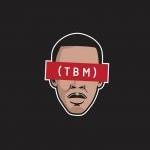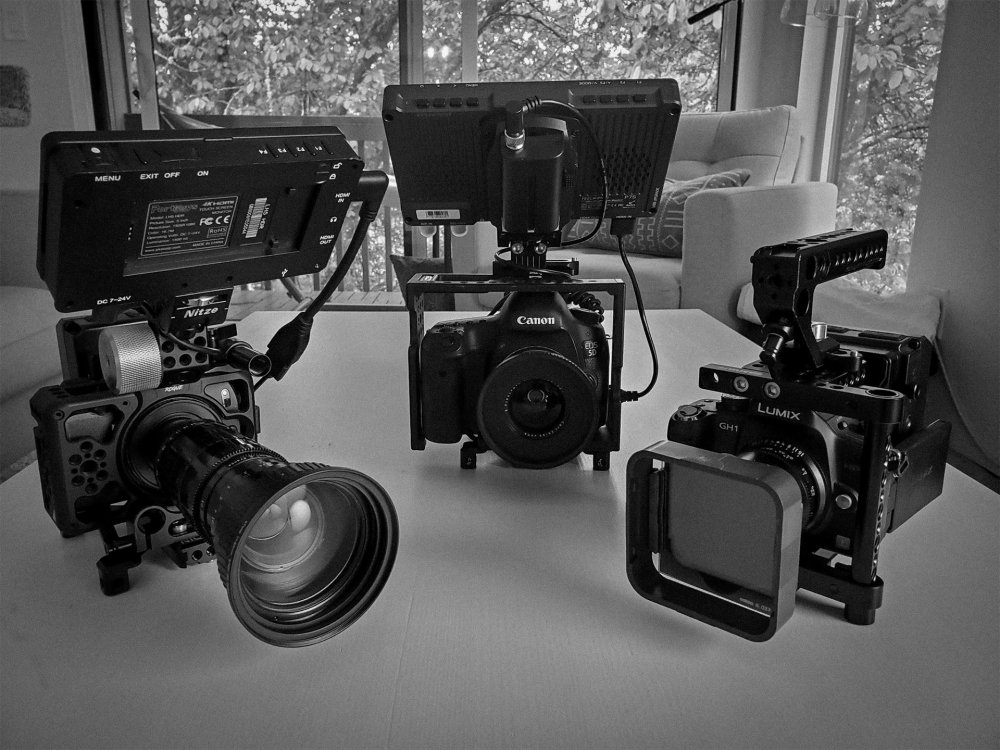-
Posts
1,138 -
Joined
-
Last visited
About QuickHitRecord

Profile Information
-
Gender
Male
-
Location
Portland, OR, USA
-
Interests
Experimental techniques for creating timeless images
-
My cameras and kit
2x C70s, EOS-R, 5Diii, EOS-M, GH1
Contact Methods
-
Website URL
http://www.portlandvideographer.com
Recent Profile Visitors
11,139 profile views
QuickHitRecord's Achievements

Long-time member (5/5)
479
Reputation
-
 eatstoomuchjam reacted to a post in a topic:
Which Canon Mirrorless (and DSLR) cameras don't overheat when recording 4K?
eatstoomuchjam reacted to a post in a topic:
Which Canon Mirrorless (and DSLR) cameras don't overheat when recording 4K?
-
I have a lot of respect for the skill involved with shooting weddings. I did two about ten years ago and decided that it wasn't for me! Yeah, no thanks. I appreciate you mentioning that. I'm not willing to take that risk! I bit the bullet and ordered a used R5C. $2400 a 22K shutter count, and a cage included. I don't expect this to become my primary camera over the C70 but will be nice to have when photos are also needed. I think I might re-buy the SmallRig v-mount plate so that I can power it off of my Intellytech mini v-mounts, and then just uncouple it from that setup and run it off of the regular battery for stills (I really like an EVF for stills). In the interest of keeping things small and lightweight, I probably will not bother with a separate monitor.
-
I don't know how you wedding shooters routinely manage these kinds of logistics! This is interesting. Thank you for sharing! I hadn't really considered the R7 because I don't love the way that Canon has implemented an all-or-nothing approach to IBIS and IS. But I didn't realize that it was actually pretty good on the overheating front. It's worth a second look. Since you own both the R5C and the R8, is the 24P 4K from the R5C that much better? Is the DPAF better on the R8? And is there a way temporarily disable autofocus on the R8 by holding down a button? Good to know!
-
 QuickHitRecord reacted to a post in a topic:
Which Canon Mirrorless (and DSLR) cameras don't overheat when recording 4K?
QuickHitRecord reacted to a post in a topic:
Which Canon Mirrorless (and DSLR) cameras don't overheat when recording 4K?
-
 QuickHitRecord reacted to a post in a topic:
Which Canon Mirrorless (and DSLR) cameras don't overheat when recording 4K?
QuickHitRecord reacted to a post in a topic:
Which Canon Mirrorless (and DSLR) cameras don't overheat when recording 4K?
-
 QuickHitRecord reacted to a post in a topic:
Which Canon Mirrorless (and DSLR) cameras don't overheat when recording 4K?
QuickHitRecord reacted to a post in a topic:
Which Canon Mirrorless (and DSLR) cameras don't overheat when recording 4K?
-
 QuickHitRecord reacted to a post in a topic:
Which Canon Mirrorless (and DSLR) cameras don't overheat when recording 4K?
QuickHitRecord reacted to a post in a topic:
Which Canon Mirrorless (and DSLR) cameras don't overheat when recording 4K?
-
Interesting. Though for narrative, there are lots of long breaks. There are breaks during the b-roll I shoot too, but I'm often in the hot sun. I'm kind of tempted to give the R8 a try. Josh Sattin's videos suggest that it can roll for over two hours continuously in 24P. That goes down significantly in 60P, but I tend to shoot about 70% of my b-roll in 24P. I've been trying to do the same. Four years ago, I was lugging around a pair of 575w HMIs(!). Now I have a rule that if a client wants more than what I can fit on my cart, they need to budget for my gaffer too. But getting hired for photo + video is always a problem for me because it means multiple bodies, multiple lenses, etc. I've held off because I don't think the quality is really there, but at this point I am willing to make some sacrifices.
-
Other than the pricey R5C, of course. Also, I don't think my EOS-R has ever overheated. But it has a significant crop. Maybe the 1D-C, 1D-X ii or iii? I don't care about 30-min recording time limits. This would only be for b-roll and photos. Asking because I almost blacked out during a paid video + photo shoot out in the sun today. When I came home and weighed the gear I was hauling around (rigged up C70, EOS-R, tripod, lenses, batteries), it was 32lbs. I can't put this off anymore. It's time for a hybrid. And yes, I am too invested in Canon to consider any mount other than RF or EF.
-
 PannySVHS reacted to a post in a topic:
Kodak CCD / Leica M8 sensor camera for £45
PannySVHS reacted to a post in a topic:
Kodak CCD / Leica M8 sensor camera for £45
-
 maxJ4380 reacted to a post in a topic:
Kodak CCD / Leica M8 sensor camera for £45
maxJ4380 reacted to a post in a topic:
Kodak CCD / Leica M8 sensor camera for £45
-
 eatstoomuchjam reacted to a post in a topic:
Kodak CCD / Leica M8 sensor camera for £45
eatstoomuchjam reacted to a post in a topic:
Kodak CCD / Leica M8 sensor camera for £45
-
-
Brought mine along on my honeymoon in Ecuador a few years ago. Kind of a slow camera to work with and not my usual keeper rate, but I do like the shots that I was able to get:
-
 PannySVHS reacted to a post in a topic:
Movies looked better before "color grading" was invented. Let's return to proper film-making.
PannySVHS reacted to a post in a topic:
Movies looked better before "color grading" was invented. Let's return to proper film-making.
-
I kind of agree with the original post in that we have lost something. But I also wonder if that "something" was the innocence of youth. I remember being completely immersed in the blockbusters of the 1990s as a kid. It takes a lot to even approach that feeling decades later. Nostalgia is a powerful thing. I remember watching Phantom Thread (2017) for the first time. I was completely immersed by the understated beauty of the visuals. When I looked to see what camera they had used, it was Kodak Vision3 200T and 500T. That being said, I've generally been ditching the multi-node grading workflows of Resolve in favor of simple global adjustments in Premiere (my native platform). No windows, which were not readily available in the days of celluloid. The resulting images have an honesty to them and don't seem to by vying for anyone's attention.
-
 Juank reacted to a post in a topic:
Documentarians?
Juank reacted to a post in a topic:
Documentarians?
-
 Ninpo33 reacted to a post in a topic:
Documentarians?
Ninpo33 reacted to a post in a topic:
Documentarians?
-
Someone on this forum is actually producing work and putting it out into the world?! I had to watch and I am glad that I did. I thought that the visuals and editing were really nice. I loved the energy you created in the opening; it was riveting right off the bat. Hal is a memorable and interesting character. I tend to think of raptors as generally solitary so seeing such a magnificent series of "rivers" was a real treat -- I had no idea. I am by no means a wildlife documentarian, but I'd like to offer a little critique. You've got a great setup but then I was waiting for an obstacle. Something that raises the stakes. Is the solar farm or other development being pushed through? What happens when Hal steps down? Or (and I really hope that this doesn't happen), what effect will the new strain of avian flu have on these birds? I think it might be worth keeping in touch with these folks because any one of those scenarios would add the drama that a piece like this needs to get into the bigger festivals or broadcast. Or if it just doesn't look like the story will evolve much more (or you're just ready to move onto the next thing), I'd recommend cutting it down to a very tight 20-25 minutes. Maybe the climax is when the influx of birders come out in response to the email. There was good tension in that scene, like the citizen scientists were about to lose control of the mob. Now a couple of questions. I saw in another post that you shot this with something like a dozen different cameras. What was the reason for that? Did any of them prove to be particularly documentary-friendly? It seemed like you had a LOT of people wearing lav mics and you caught some really choice soundbytes that added a lot to your story. What was your approach to audio? And how many times would you say that you've been out there for a shoot? One last thing. The screener was only in 480P but that didn't stop the story from coming through at all. 4K be damned. Great job on this and thanks for sharing. It was the most compelling share I've seen here in quite a while!
-
 eatstoomuchjam reacted to a post in a topic:
What is the maximum number of cameras you need
eatstoomuchjam reacted to a post in a topic:
What is the maximum number of cameras you need
-
 IronFilm reacted to a post in a topic:
What is the maximum number of cameras you need
IronFilm reacted to a post in a topic:
What is the maximum number of cameras you need
-
 j_one reacted to a post in a topic:
What is the maximum number of cameras you need
j_one reacted to a post in a topic:
What is the maximum number of cameras you need
-

What is the maximum number of cameras you need
QuickHitRecord replied to Andrew Reid's topic in Cameras
I've cycled through a lot of cameras to get here (including Blackmagic, Sony, and two REDs) and ended up selling off about a dozen cameras last year. I think I'm finally happy. I can't think of anything else that I really want and I haven't purchased a camera in almost two years, which is a record for me: WORK/DOCUMENTARY/NARRATIVE CAMERAS Canon C70 x2 FUN/EXPERIMENTAL CAMERAS Canon 5Diii with ML Canon EOS-M with ML Lumix GH1 (hacked) Lumix FZ47 STILLS CAMERAS Canon EOS-R Olympus E500 Fujifilm E900 Canon Elan (Film) If I could snap my fingers and add a camera to this list, it would be the Ikonoskop A-Cam. Or, I'd probably buy an Octopus16 if they ever get around to releasing it. -
I think you're onto something. Getting people out of pixel peeping and into actually making (and sharing) stuff is an unmet need. Think about all of the hobbyists who caught in a cycle of constant upgrading and never shoot anything other than their cat or their significant other making coffee. I know that EOSHD has done this at least once in the past. DVXuser used to do it too. A couple of brainstorms that I may have shared before: 1) A monthly challenge that imposes a creative limitation each time (i.e. shoot everything at f/8; use only natural light; shoot in standard definition; shoot something in the style of Wes Anderson; use a pre-2012 camera; capture a short scene about a conflict between two joggers, etc.). The prompts can come from Andrew or member suggestions. 2) Old camera "round robin". Established members pitch in a low-value camera body and ship it to the next member, who tries to get the best footage possible out of it before shipping it to the next member, etc. All results are shared and discussed. Maybe there would have to be several of these going, one for each continent.
-
I have my two C70s dialed in so precisely to my needs that even after ~5 years, I can't imagine replacing them. One of them is built up for handheld operation, and the other is stripped down for travel. So, I really don't need anything else at this point. That being said, an updated version of the Canon EF-S 17-55mm f2.8 in RF mount would be a no-brainer for me. They could even use the same glass from the older version and just update the AF.
-
There is a list of models compatible with PageOS 5 (which introduces EL Zone) on SmallHD's website. If memory serves, the 510 cannot be upgraded to 5, but the FOCUS monitors can.
-
I have a Focus 5 OLED. Nice colors and 1080P (vs 720P on the original Focus, which is brighter). And you can upgrade the firmware to take advantage of the EL Zone exposure tool. Once you've used that, you'll never want to bother with any other exposure tools. I also have the SmallHD Indie 5, which checks ALL of the boxes for me. If you can stomach the price or maybe wait for a sale, I see no reason why it would not be the last monitor you'll ever buy.






